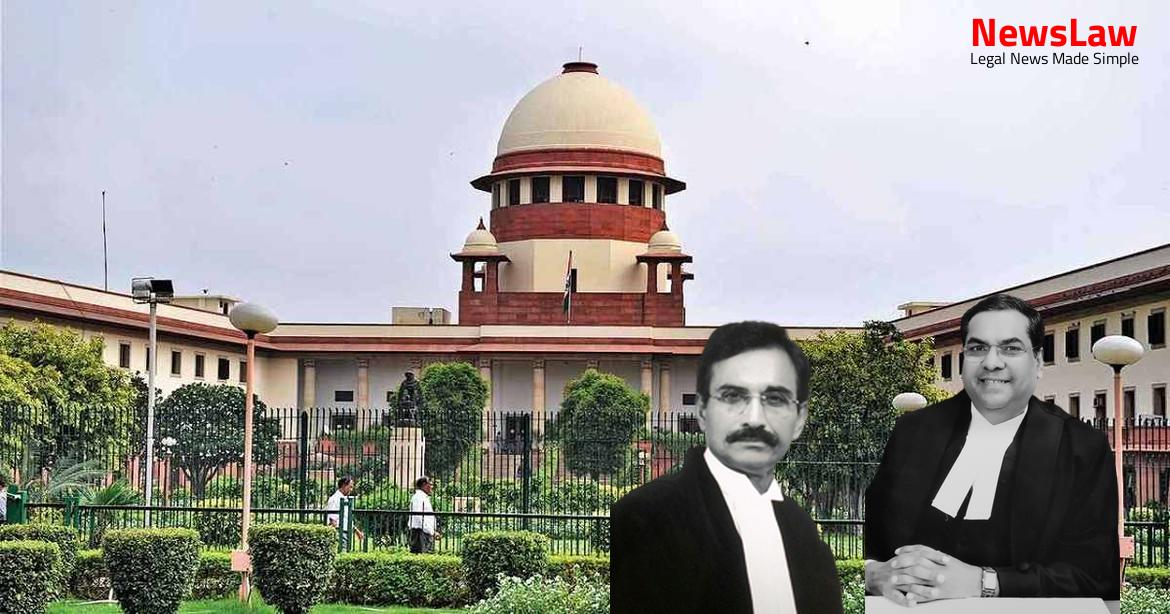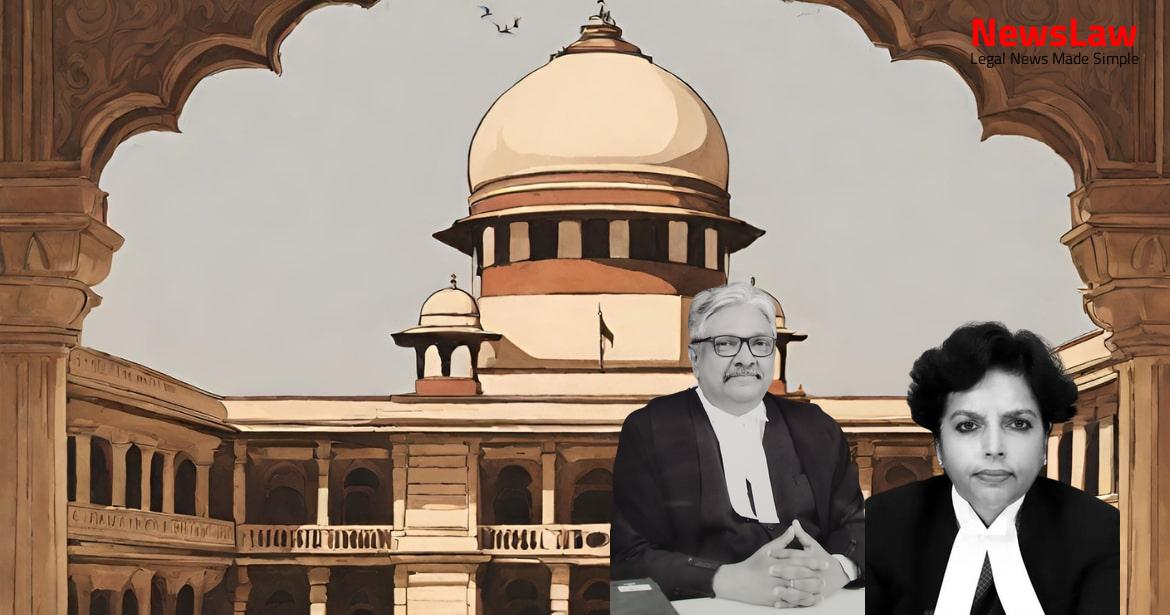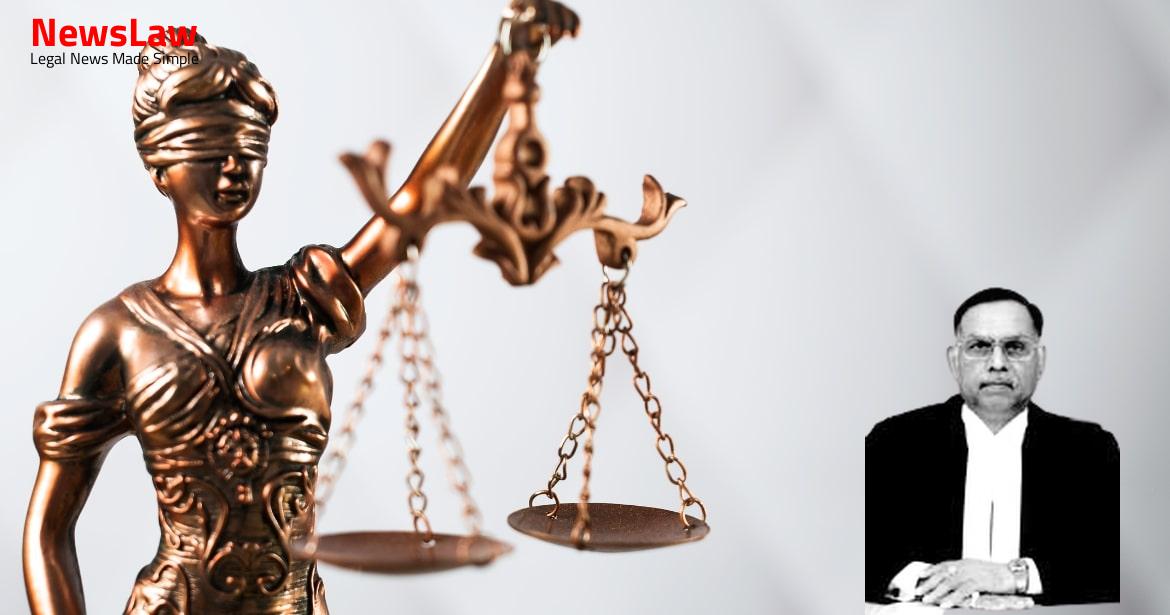Delve into a significant legal case where the Court provided a detailed legal analysis on the culpability of the accused in honour crimes. The focus is on the Court’s thorough examination of witness testimonies, highlighting the importance of witness protection in ensuring a fair trial. Stay tuned for a comprehensive overview of the legal intricacies involved in this landmark judgment.
Facts
- 39 accused were tried by the Trial Court.
- Appeals were filed by 35 convicts before the High Court.
- During the recording of evidence, PW-13 turned hostile.
- PW-15 corroborated the evidence of PW-1.
- Panchayat convened on 26.03.1991 where physical assault and torture took place.
- Several accused were involved in assaulting and hanging the victims.
- Complaint lodged and police rushed to the scene of the crime.
- Medical and scientific evidence supported the torture and killings.
- Accused were charged under various sections of IPC and SC/ST Act.
- Several accused were convicted by the Trial Court.
- FIR registered based on statements made by witnesses.
- Evidence of witnesses revealed detailed accounts of the incident.
- Several accused individuals mentioned in the complaint and during the trial.
- Multiple accused individuals played active roles in the crime.
- Witnesses gave detailed accounts of the Panchayat and subsequent events.
- Several individuals turned hostile during the trial.
- Trial proceedings interrupted and stayed by High Court.
- Consolidation of cases requested during trial proceedings.
- Interim stay orders vacated by High Court.
- Witnesses and complainants faced physical assault and threats.
- Recovery of white Tahmad and clothes of deceased Ram Kishan, along with burnt bones and flesh, supports prosecution’s version of bodies being burnt.
- High Court relied on testimonies of prosecution witnesses despite several turning hostile, after recording compelling reasons.
- Two out of 35 convicts were acquitted by the High Court, and death sentences of 8 accused were commuted to life imprisonment.
- Witnesses like PW-1 Shanti turned hostile possibly due to societal pressures and Witness Protection Scheme could have prevented this.
- Murder of Roshni, Vijendra, and Ram Kishan was established beyond doubt, leading to convictions under various sections of the IPC and SC/ST Act.
- Several appellants-accused were sentenced to life imprisonment or death, which was later commuted by the High Court.
- Appeals were filed by convicted individuals, with the State of Uttar Pradesh also filing appeals against commutation of death sentences to life imprisonment.
Also Read: Reversal of High Court’s Decision on Auction Sale Confirmation
Issue
- The issue in question is the point of time at which the accused discovered that the assembly intended to kill the victim.
- The question for consideration is the culpability of the Appellants in light of this discovery.
Also Read: Interest Compensation Dispute in Property Demolition Case
Arguments
- Appellants argued that testimonies of eye-witnesses are contradictory and should be rejected.
- Court found the witnesses reliable despite minor inconsistencies in their testimonies.
- Emphasized the importance of witness protection in sensitive cases involving influential or powerful accused.
- Discussed the Witness Protection Scheme, 2018 approved by the Court in a previous case.
- Explained vicarious liability under Section 149 of the Indian Penal Code for members of an unlawful assembly.
- Differentiated between common object and common intention in proving criminal liability.
- Argued that 19 persons named as accused later were falsely implicated.
- Reiterated the impartiality of the law regardless of factors like caste, religion, or political beliefs.
- The ghastly crime was committed at four different places
- The crime occurred over a prolonged period of more than 12 hours
Also Read: Legal Interpretation of Extension of Judicial Member’s Term
Analysis
- The High Court’s judgment was examined by the Supreme Court to determine if the principles were followed.
- Court upheld the findings of the High Court if no violation of principles or grave miscarriage of justice was found.
- In cases where High Court’s approach was correct and no crucial evidence was ignored, the findings of fact were not disturbed.
- Witnesses’ right to testify in court without pressure is emphasized.
- Instances where witnesses mentioned names without specifying fathers or where contradictions were trivial were highlighted.
- Retrial of evidence is uncommon, only in cases of serious legal errors or miscarriage of justice.
- Inconsistencies in witness testimonies are deemed natural, especially in complex cases.
- Reliability of testimonies, even when witnesses turn hostile, plays a crucial role in conviction.
- Specific overt acts were ascribed to multiple appellants in the case.
- Convictions under Section 302 with Section 149 IPC were deemed appropriate by the Courts.
- Caste-based crimes and their impact on equality and justice were discussed.
- Role of accused in unlawful assemblies was analyzed in determining guilt.
- Directives for the establishment of safe houses and special cells to prevent honor killings were outlined.
- Steps involving immediate investigation, security measures, and fast-track trials were emphasized.
- The need for societal condemnation of caste-based honor killings was underlined by the Court.
- Importance of preventing threats and pressures on witnesses for a fair trial.
- State Governments directed to identify districts with instances of honour killings or assembly of khap panchayats
- Directives issued to police officers to be extra cautious of inter-caste or inter-religious marriages
- Immediate reporting of proposed gatherings of khap panchayats to higher authorities
- Factors identified as indicators of aggravating circumstances for enhanced punishment
- Special reasons required for imposition of death sentence under Section 354 (3) of the Code of Criminal Procedure, 1973
- Upholding of enhanced sentence based on Hate Crimes Statutes
- Establishment of Special Cells in every district for safety of couples in inter-caste marriages
- Strict enforcement of Witness Protection Scheme, 2018
- Disciplinary action against officials who fail to prevent or promptly handle incidents related to honour crimes
- Importance of considering aggravating and mitigating factors in sentencing decisions
- Acceptance of credible evidence, even from hostile witnesses, in criminal trials
- Need for preventive, remedial, and punitive measures to address honour crimes and ensure individual liberty and safety
- Hari son of Govinda, Lal Singh son of Khushi Singh, and Girraj son of Govinda are acquitted.
- Girraj son of Govinda is entitled to the benefit of doubt due to confusion in identity and presence during the crime.
- No need for a fresh appraisal of evidence as the concurrent findings are not erroneous.
- Concurrent findings on the crime and appellant’s involvement cannot be reviewed by this Court.
- Safe houses for couples facing opposition from families or communities
- Supervision by District Magistrate and Superintendent of Police
- Investigation by Additional Superintendent of Police
- Filing of FIR and invoking Section 151 CrPC against threats
- Charging members of khap panchayat for conspiracy or abetment
- Implementation of Rajasthan Prohibition of Interference with the Freedom of Matrimonial Alliances Act, 2019
- Consideration of aggravating circumstances for sentencing
- Ghastly murders falling under anti-social and abhorrent nature of crime
- Death sentence converted to life imprisonment for barbaric murders
- Non-compliance with directions to be deemed as deliberate negligence
Decision
- The High Court judgment is upheld, and the conviction and sentence of the accused are affirmed.
- The Criminal Appeals are disposed of.
- Accused individuals Dhanni, Nitro, Srichand, Tej, Bachchu, Kamal, Ram Singh, Raman, Sirro, Mahender, Mangtu, Chattar Singh, Pitam, Bato, Jivan, Karan Singh, Mangtu, Ganga Ram, Dharamvir, Balli, Dharam, Manni, Kashi, and Dharam are convicted.
- Accused individuals Hari, Lal Singh, and Giriraj are acquitted due to ambiguity in identity.
Case Title: HARI Vs. THE STATE OF UTTAR PRADESH (2021 INSC 792)
Case Number: Crl.A. No.-000186-000186 / 2018



